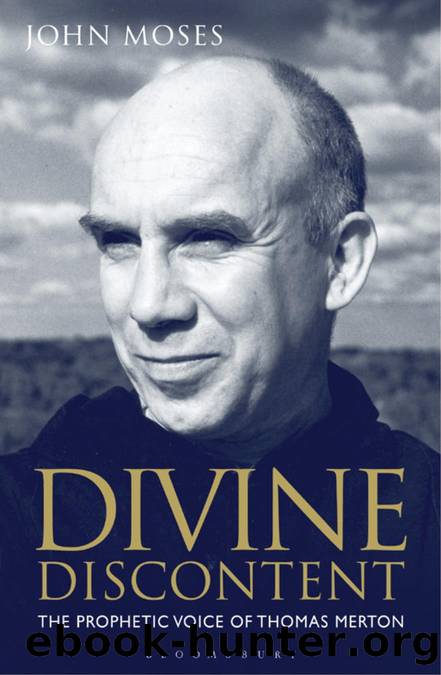Divine Discontent by John Moses

Author:John Moses
Language: eng
Format: epub
ISBN: 9781441126696
Publisher: Bloomsbury Publishing
Published: 2019-11-23T00:00:00+00:00
Theological foundations
Merton saw the times in which he lived as a post-Christian age, and it was therefore proper that he should draw in his thinking upon a great diversity of sources. His starting point was the Christian gospel and the Christian conscience, but over and above the predictable sources â the Old Testament prophets and the Desert Fathers â he owed much to the writings of Erich Fromm, CzesÅaw MiÅosz, Albert Camus and Simone Weil, and to the far more conspicuously present influences of the Zen Masters, of Mahatma Gandhi and Boris Pasternak. What he found in them and many others through reading and correspondence was a confirmation of the contemplative vocation, in nurturing the freedom of the individual in the face of the forces of collective irresponsibility.
It was the social consequences of the monastic and the contemplative vocations that were so important for Merton in his later years. What followed, therefore, was the conviction that âone cannot live and die for himself alone. My life and death are not purely and simply my own business. I live by and for othersâ.16 No other rationale would be required for the social critique, wide ranging and hard hitting, that he felt compelled to make, but two primary Christian theological affirmations â incarnation and eschatology â underscored everything he had to say.
It was the doctrine of the incarnation, informed by Mertonâs mystical theology, that enabled him to see men and women in an entirely new light. âIn Christ, God became not only âthisâ man, but also in a broader and more mystical sense ⦠âevery manâ.â 17 It followed, therefore, that no Christian could be indifferent to the fate of any other person, because every person must be seen in some sense as Christ. But the insights Merton drew from his theology were reinforced by an understanding of the realities of life. The interdependence of nations and peoples required a new sense of mutual solidarity and mutual responsibility. The dynamics of a new world order served only to strengthen his theological presuppositions. âIt is no longer even a question of âmy brotherâ being a citizen in the same country. From the moment the economy of another country is subservient to the business interests of my country I am responsible to those of the other country who are âin needâ.â 18
If it is the case that everyone is bound up in the lives of everyone else, then there are connections to be made with a Christian understanding of Christâs mystical body, the church. From the beginning, there had been somewhere near the heart of Mertonâs understanding of mystical theology the conviction that âChrist suffers in the Church: and there is nothing suffered on earth that Christ Himself does not suffer. Everything that happens to the poor, the meek, the desolate, the mourners, the despised, happens to Christ.â19 The softening of the hard edges of Mertonâs earlier way of thinking about the church and the world did not lead him, however, to abandon his
Download
This site does not store any files on its server. We only index and link to content provided by other sites. Please contact the content providers to delete copyright contents if any and email us, we'll remove relevant links or contents immediately.
| Catechisms | Devotionals |
| Hymns & Hymnals | Meditations |
| Monasticism & Asceticism | Pentecostal & Charismatic |
| Prayerbooks | Rites & Ceremonies |
| Sacraments |
Fangirl by Rainbow Rowell(9211)
How to Bang a Billionaire by Alexis Hall(8128)
Wonder by R. J. Palacio(8085)
The Space Between by Michelle L. Teichman(6911)
The Thirst by Nesbo Jo(6909)
Assassin’s Fate by Robin Hobb(6184)
Wiseguy by Nicholas Pileggi(5745)
The Night Circus by Erin Morgenstern(5202)
Paper Towns by Green John(5163)
The Kite Runner by Khaled Hosseini(5151)
Bittersweet (True North #1) by Sarina Bowen(4830)
Gerald's Game by Stephen King(4623)
Too Much and Not the Mood by Durga Chew-Bose(4319)
Pillow Thoughts by Courtney Peppernell(4262)
Goodbye Paradise(3790)
Twelve Days of Christmas by Debbie Macomber(3544)
Good by S. Walden(3534)
The Rosie Effect by Graeme Simsion(3445)
The Cellar by Natasha Preston(3316)
